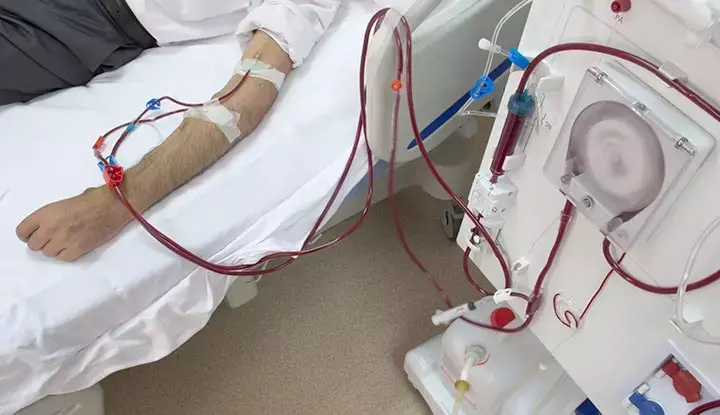- Home
- Medical news & Guidelines
- Anesthesiology
- Cardiology and CTVS
- Critical Care
- Dentistry
- Dermatology
- Diabetes and Endocrinology
- ENT
- Gastroenterology
- Medicine
- Nephrology
- Neurology
- Obstretics-Gynaecology
- Oncology
- Ophthalmology
- Orthopaedics
- Pediatrics-Neonatology
- Psychiatry
- Pulmonology
- Radiology
- Surgery
- Urology
- Laboratory Medicine
- Diet
- Nursing
- Paramedical
- Physiotherapy
- Health news
- Fact Check
- Bone Health Fact Check
- Brain Health Fact Check
- Cancer Related Fact Check
- Child Care Fact Check
- Dental and oral health fact check
- Diabetes and metabolic health fact check
- Diet and Nutrition Fact Check
- Eye and ENT Care Fact Check
- Fitness fact check
- Gut health fact check
- Heart health fact check
- Kidney health fact check
- Medical education fact check
- Men's health fact check
- Respiratory fact check
- Skin and hair care fact check
- Vaccine and Immunization fact check
- Women's health fact check
- AYUSH
- State News
- Andaman and Nicobar Islands
- Andhra Pradesh
- Arunachal Pradesh
- Assam
- Bihar
- Chandigarh
- Chattisgarh
- Dadra and Nagar Haveli
- Daman and Diu
- Delhi
- Goa
- Gujarat
- Haryana
- Himachal Pradesh
- Jammu & Kashmir
- Jharkhand
- Karnataka
- Kerala
- Ladakh
- Lakshadweep
- Madhya Pradesh
- Maharashtra
- Manipur
- Meghalaya
- Mizoram
- Nagaland
- Odisha
- Puducherry
- Punjab
- Rajasthan
- Sikkim
- Tamil Nadu
- Telangana
- Tripura
- Uttar Pradesh
- Uttrakhand
- West Bengal
- Medical Education
- Industry
Age, Inflammation, and handgrip Strength stronger predictors of mortality than BNP in CKD Patients: Study

A new pilot study published in the BMC Nephrology revealed that while brain natriuretic peptide (BNP) levels were associated with all-cause mortality in patients with chronic kidney disease (CKD) and those on hemodialysis, overhydration (OH) was not. Further after adjusting for other clinical and biochemical variables, age, inflammation, and handgrip strength emerged as stronger and independent predictors of mortality than BNP.
The 5-year prospective observational study followed 64 CKD patients on hemodialysis to explore the interplay between BNP levels, overhydration (OH), and all-cause mortality. BNP is widely used as a cardiac biomarker, particularly in conditions involving fluid imbalance and heart strain. In CKD patients, fluid management is crucial, as overhydration can worsen outcomes.
By the end of the study, 33 patients (52%) had died. Early analysis revealed several significant bivariate correlations with mortality: higher age (correlation coefficient r = 0.38), elevated BNP levels (r = 0.48), reduced handgrip strength (r = -0.34), lower lean tissue index (r = -0.41), and higher C-reactive protein (CRP) levels (r = -0.34), a marker of inflammation.
Initial regression models indicated that BNP was a strong predictor of mortality (Hazard Ratio [HR] 2.61), suggesting that patients with an increased BNP levels had more than double the risk of death. However, when adjusting for other clinical and biochemical indicators like age, CRP, and handgrip strength, BNP lost its statistical significance as a predictor.
Instead, the final Cox regression model highlighted 3 standout predictors: 1 being age, where each additional year was associated with a 4% increase in mortality risk (HR 1.04), 2 being handgrip strength which showed that greater strength was protective, with a 5% reduction in mortality risk per unit increase (HR 0.95) and CRP Levels which associated with a more than 2-fold increase in mortality (HR 2.61).
Overhydration (OH) did not show a statistically significant relationship with mortality in this study. This finding suggests that while OH is important for symptom control and quality of life, it may not directly impact survival when considered along with stronger indicators like age, inflammation, and physical strength. Overall, the study emphasized that in patients with CKD on hemodialysis, traditional markers like BNP may not be the most reliable indicators of mortality risk.
Reference:
Svensson, M. K., Nassar, R., Melin, J., Lindberg, M., Furuland, H., & Stenberg, J. (2025). Brain natriuretic peptide and all-cause mortality in patients treated with haemodialysis. BMC Nephrology, 26(1), 291. https://doi.org/10.1186/s12882-025-04251-8
Neuroscience Masters graduate
Jacinthlyn Sylvia, a Neuroscience Master's graduate from Chennai has worked extensively in deciphering the neurobiology of cognition and motor control in aging. She also has spread-out exposure to Neurosurgery from her Bachelor’s. She is currently involved in active Neuro-Oncology research. She is an upcoming neuroscientist with a fiery passion for writing. Her news cover at Medical Dialogues feature recent discoveries and updates from the healthcare and biomedical research fields. She can be reached at editorial@medicaldialogues.in
Dr Kamal Kant Kohli-MBBS, DTCD- a chest specialist with more than 30 years of practice and a flair for writing clinical articles, Dr Kamal Kant Kohli joined Medical Dialogues as a Chief Editor of Medical News. Besides writing articles, as an editor, he proofreads and verifies all the medical content published on Medical Dialogues including those coming from journals, studies,medical conferences,guidelines etc. Email: drkohli@medicaldialogues.in. Contact no. 011-43720751


